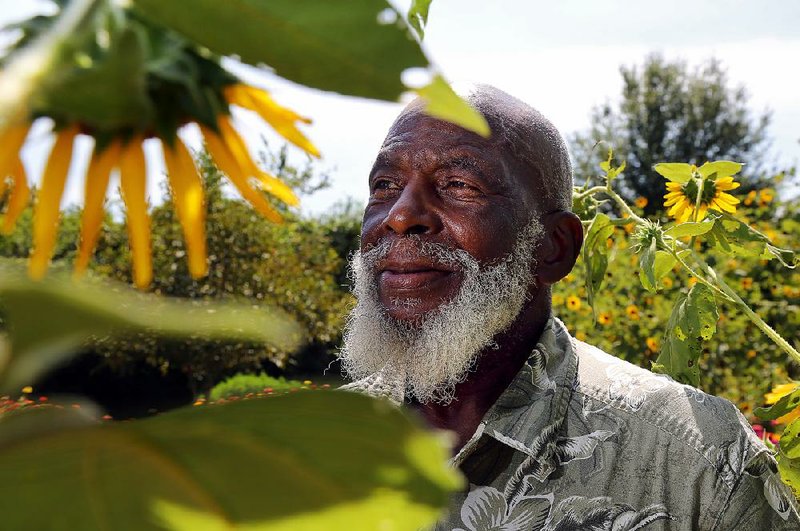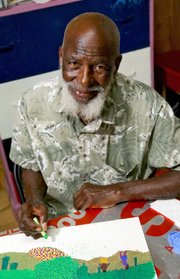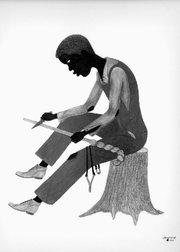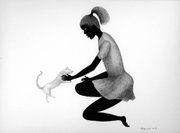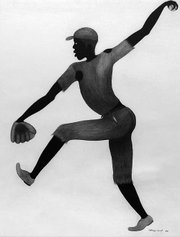SOUTHLAND -- In 1981, when he was 40 years old, farmer and timber-cutter Alonzo Ford enrolled in art classes at Phillips County Community College in Helena. He rode his bicycle into town from the Southland farm where he grew up, a round trip of more than 20 miles, to find out all he could about making art.
"I didn't know how to draw, didn't know how to paint, but I was attracted to it," Ford says. "I just heard talk of [art] and I liked to see it. I was interested in it and the people who did it. To me, they had a different way of acting and looking when I seen them on television. I've always been curious."
“A Little Poetry: The Art of Alonzo Ford”
Tuesday through S̶e̶p̶t̶.̶ ̶2̶5 Oct. 25*, Arkansas Arts Center, Ninth and Commerce streets, Little Rock. The exhibit is part of the Acansa Arts Festival.
Hours: 10 a.m.-5 p.m. Tuesday-Saturday, 11 a.m.-5 p.m. Sunday
Admission: Free
Info: arkansasartscenter.…, (501) 372-4000
For two years, he rode his bike to class, first trying pottery and then gravitating toward drawing and painting, filling a class sketchbook with carefully rendered studies in pencil, charcoal and pastels that range from abstract geometric shapes to skyscrapers, trees and portraits.
Ford had found his calling. He was an artist.
That sketchbook of early work, along with 27 other pieces that showcase the singular style he has developed over the years, will be displayed at the Arkansas Arts Center's exhibit "A Little Poetry: The Art of Alonzo Ford," S̶e̶p̶t̶.̶ ̶1̶5̶-̶2̶5 Sept. 15-Oct. 25*. The exhibit is part of the Acansa Arts Festival, which runs Sept. 16-20 and features art education programs,
live performances and other activities around central Arkansas.
"His work is so interesting," says Ann Prentice Wagner, curator of drawings for the Arts Center. "He documents the history of African-American life in the Arkansas Delta, and he also has this wonderful design aesthetic. He is someone who really knows how to make something beautiful and expressive."
Ford, 74, is seated at a table in the 30-by-11-foot prefab wooden building that serves as his studio and that he paid for with the sale of one of his drawings. It sits behind a little white house on 80 acres of land his father, Henry, and mother, Cornelia, bought in the early '40s. It was on this ground that they operated a sorghum mill and grew cotton, corn, hay, vegetables and livestock to support themselves and their 13 children, of which Alonzo was the 11th.
"Everyone owned their own land," he said of Soutland back then. "It was a very self-supporting community. We lived off what we raised."
On the walls of his tidy studio are three of his paintings -- a young woman, an abstract piece of colorful splatters and one of frolicking horses -- all hung well apart from each other. A small air conditioner keeps the little building cool, although this Delta afternoon in August isn't as brutally hot as usual. He works at a small folding table near the back.
Ford's head is shaved bald and he wears a wispy white beard. His voice is soft; he often smiles kindly.
His father died in 1961, and though Alonzo, who never married, would leave Southland periodically for work in Chicago, Wisconsin, Detroit and California, he always returned after a year or two to work this land. By 1971, he was home for good, farming, cutting timber and taking care of his mother.
In the late '70s, he began suffering from mysterious fainting spells and was having a hard time working.
"I was mostly sick," he says of that time, and he was also gripped by a crisis. "I'd been doing some of everything -- this and that -- and there wasn't going to be no record of what I had been doing in my life. So I thought, 'I've got to come up with something to leave a record, a history of what I've been doing.' The greatest thing that I could come up with was art, so I decided that I would do that."
After he took up his art, the fainting spells went away.
Ford's images often reflect rural life and scenes he remembers from his youth. There are drawings of children playing, a boy and a girl with the fish they've caught, a local baseball player, churches, people picking cotton. There are representational pieces as well as abstract work. Some of the most striking are the finely drawn charcoal and pencil figures in profile on stark white backgrounds.
"He has developed various concepts with the profile figure," Wagner says. "He gives you this beautiful, graceful line with lots of details."
"They are done from memory," says Ford, who left school in the 11th grade. The images of farm life are sometimes not the most popular.
"She didn't want to see no farm scenes," he says of a cousin in Little Rock. "She didn't want to see nobody picking cotton. Young people coming from the country try to distance themselves from that. But they don't think about history. They just think it was a lot of hard work."
His work was first shown publicly at the West Helena Public Library in the '80s. He took some cypress roots he sanded smooth and stained a gorgeous amber and put them on display. Exhibits at the Phillips County Museum, the Fine Arts Center in Hot Springs and Collectors Art Gallery in Washington eventually followed.
The forthcoming Arts Center show, Wagner says, is "the largest and most complete exhibit of his work that has ever been held."
In the early '90s, Ford took a few works to the Arkansas Arts Center and was met with encouragement from center director Townsend Wolfe.
"He gave me the highest compliment," Ford said. "And he told me to get some better paper." He went back to the Southland farm and kept working.
When asked how he would describe the kind of art he does -- is it folk art? Outsider art? Primitive? -- Ford is dismissive. "It don't matter to me," he says of such labels.
"He's very unique to his surroundings," says Bill Branch, curator of the Delta Cultural Center in Helena, where Ford's work has been displayed.
A favorite of Branch's, and a piece that still hangs at the cultural center, is a graphite and charcoal drawing titled When Cotton Were King.
"There are figures pulling tow sacks," Branch says. "And the cotton field is composed of rows and along those rows you will find every boll of cotton, and you realize Alonzo drew every single one of those cotton bolls. The amount of detail and time it took to create is incredible."
"That was one of my best pieces," Ford says. "It took a long time to do that." Close to a year, actually.
That sort of obsessive attention to the tiniest of detail is a hallmark of his work.
"I don't believe in letting nothing go until it's done right, the way I want it to be," Ford, a member of the Arkansas Arts Center, says. He works slowly, with great care. A typical drawing can take three to six months to complete, and he usually works on just one at a time. He prefers to work in the morning, with a clear mind, though he will answer the muse's call at any hour.
"The morning is best, when I get myself awake good. Drink some coffee, walk around the garden and get my mind working," he says. "But if that bug gets on you and you can't cut it loose, then I'll get up in the night and work on art."
"I was impressed with his consistency and the stories behind his pieces," says Garbo Hearne, owner of Hearne Fine Art in Little Rock, who has exhibited his work and who represents Ford. "He's very serious about his work and telling his story. He's very focused on every piece being a masterpiece."
The drive for perfection is constant.
"That's the only way to be," he says with a laugh when it is pointed out that maybe he has a bit of a competitive streak. "That's the only way I know how to be. If I just keep my mind on my art, I can be better than the rest."
Collectors have apparently taken to Ford's style. He says one work, a farm scene of a team of mules being watered after a day of cutting hay, sold for $20,000 and that pieces start around $5,000.
As much as he is known for his drawings and paintings, Ford is almost as well regarded for his gardens on the land he once worked with his family.
Giving a tour of the grounds around his home and studio as his dogs Wildfire and Coco look on from behind a fence of thin wire, he shows off sunflowers taller than basketball goals, the cypress vine he is coaxing up the face of a weathered, gray barn and a bed of zinnias that pop with bright colors even this late in the summer. There are fruit trees, oak and maple trees, hazelnut trees and a watermelon patch; there is a winding row of cotton plants that look more like trees. Everything is so carefully planned, so lovingly tended, with nary a leaf out of place, not unlike an Alonzo Ford drawing.
"His garden is just another form of art to him," Hearne says. "He is a man of many talents."
Style on 09/13/2015
*CORRECTION: The Arkansas Arts Center exhibit "A Little Poetry: The Art of Alonzo Ford" is open until Oct. 25. This story in Sunday's Style section had an incorrect closing date.
